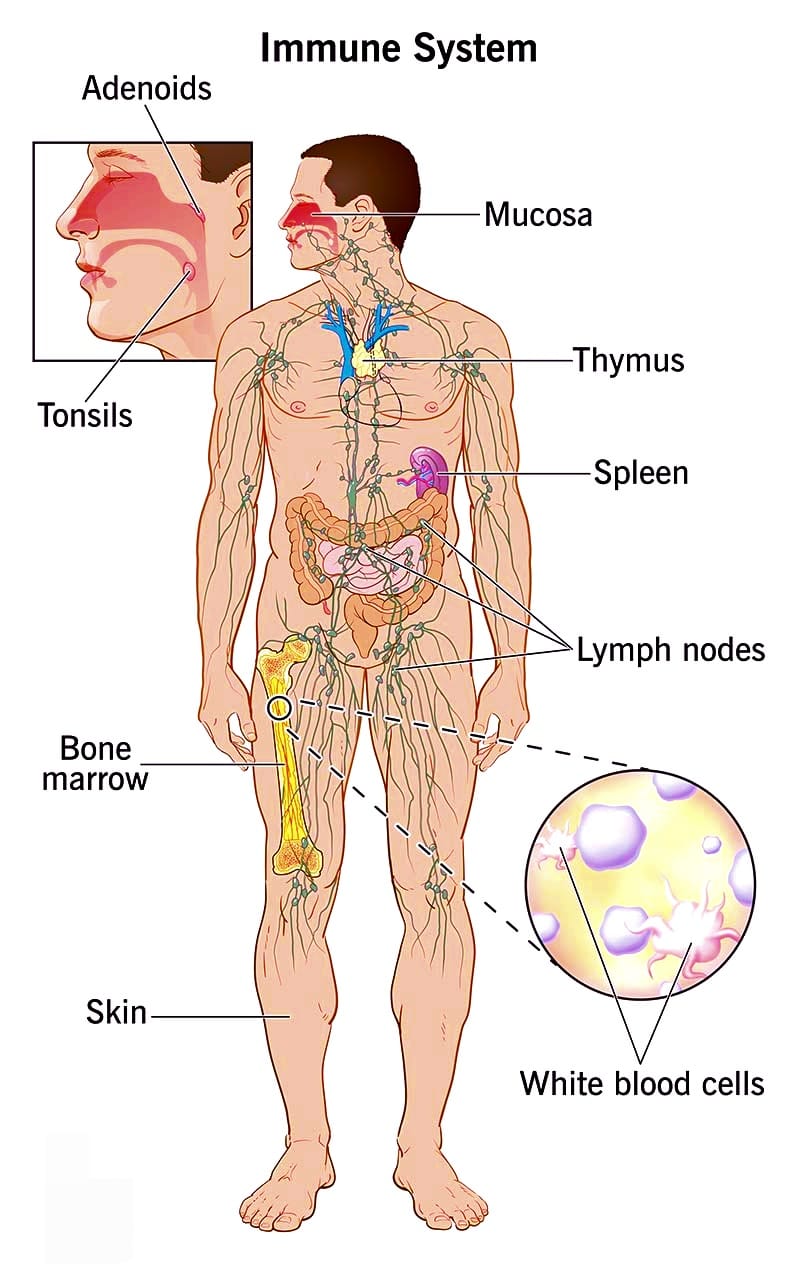Your immune system is your body’s natural defense, tirelessly working to protect you from infections, viruses, and diseases. A strong immune system not only helps you fight off illnesses but also ensures faster recovery when you do fall sick. However, immunity isn’t built overnight—it’s the result of consistent, healthy lifestyle choices.
In this guide, we’ll explore how to naturally strengthen your immune system by focusing on three essential pillars: diet, sleep, and exercise. Each of these factors plays a crucial role in equipping your body to combat harmful invaders and maintain overall well-being.
Here’s what you’ll discover:
- You will gain a comprehensive understanding of the immune system
- Powerful immune-boosting foods and nutrients that enhance your body’s defenses
- Why quality sleep is a game-changer for a resilient immune system
- Best exercises to strengthen immunity and keep you in peak health
By the end of this article, you’ll have a science-backed roadmap to fortify your immune system and stay healthy every day. For more expert tips on general and preventive healthcare, be sure to follow aayushii.com—your trusted source for wellness and vitality!
Understanding the Immune System

Before discussing the methods to strengthen immunity, it’s crucial to have a foundational understanding of what the immune system is and how it functions. Essentially, your immune system is a complex network of cells, tissues, and organs that work in tandem to protect your body from foreign invaders such as bacteria, viruses, fungi, and toxins.
Primary Components of the Immune System
The immune system is a highly specialized and intricate defense mechanism that protects the body from harmful invaders such as bacteria, viruses, fungi, and toxins. Each component plays a unique role in identifying, neutralizing, and eliminating threats. Below is an in-depth look at these essential components:
1. White Blood Cells (Leukocytes) – The Body’s Foot Soldiers
White blood cells (WBCs), or leukocytes, are the immune system’s frontline warriors. They are constantly patrolling the body, identifying and destroying harmful invaders. WBCs are produced in the bone marrow and are found in the bloodstream and lymphatic system. There are several types of white blood cells, each with a specialized function:0
01. Neutrophils – The First Line of Defense
- Most abundant WBCs (60-70% of total leukocytes).
- Specialize in attacking bacteria and fungi through a process called phagocytosis, where they engulf and destroy pathogens.
- When an infection occurs, neutrophils are the first immune cells to reach the site and help contain the infection.
- They release enzymes that break down harmful microbes but have a short lifespan, usually dying after attacking the pathogens.
02. Lymphocytes – The Adaptive Immune Warriors
Lymphocytes make up about 20-40% of WBCs and are key players in adaptive immunity, which provides long-term protection. They include:
- T-cells (T lymphocytes)
- Play a major role in identifying and destroying infected or cancerous cells.
- Cytotoxic T-cells (Killer T-cells): Directly kill virus-infected or abnormal cells.
- Helper T-cells: Act as messengers, coordinating immune responses by signaling other immune cells.
- Memory T-cells: “Remember” past infections, allowing a faster response if the same pathogen attacks again.
- B-cells (B lymphocytes)
- Produce antibodies, which are proteins that recognize and neutralize specific pathogens.
- Once an invader is marked by an antibody, other immune cells can easily eliminate it.
- B-cells also develop memory cells, ensuring a rapid response if the same infection occurs in the future.
03. Monocytes & Macrophages – The Clean-Up Crew
- Monocytes are the largest WBCs and make up 2-8% of total leukocytes. They circulate in the bloodstream before moving into tissues.
- Once they enter the tissues, they transform into macrophages, which are highly efficient in:
- Engulfing and digesting bacteria, dead cells, and debris.
- Initiating an immune response by presenting pieces of pathogens (antigens) to T-cells.
- Macrophages are long-lived and play a critical role in both fighting infections and repairing damaged tissues.
04. Eosinophils – The Allergy and Parasite Fighters
- Make up 1-4% of total WBCs.
- Specialize in fighting parasites such as worms.
- Play a key role in allergic reactions and asthma by releasing chemicals like histamine, which can cause inflammation.
- Overactive eosinophils may contribute to allergic conditions like asthma and eczema.
05. Basophils – The Rare Immune Regulators
- The least common WBCs, accounting for less than 1% of leukocytes.
- Release histamine and other inflammatory chemicals to help fight infections.
- Involved in allergic reactions and help regulate the body’s response to allergens.
- Work closely with mast cells, which are found in tissues and play a role in inflammation and immunity.
2. Lymphatic System – The Body’s Highway for Immunity
The lymphatic system is an essential part of immunity, consisting of a network of vessels, nodes, and organs that transport a fluid called lymph. Lymph is rich in white blood cells, which help fight infections. This system serves multiple roles:
- It filters out harmful substances from the body.
- It transports immune cells throughout the body to monitor for potential threats.
- It removes waste and excess fluids from tissues.
3. Spleen – The Blood’s Immune Filter
The spleen is a soft, fist-sized organ located on the left side of the abdomen. It acts as a blood filter and plays a crucial role in immunity:
- It removes old or damaged red blood cells from circulation.
- It contains large numbers of white blood cells, which detect and fight infections.
- It helps produce antibodies to respond to infections.
4. Bone Marrow – The Birthplace of Immune Cells
Located inside bones, bone marrow is a soft, spongy tissue that plays a vital role in immunity. It is responsible for producing red blood cells, white blood cells, and platelets. Without a healthy bone marrow, the body would struggle to create the necessary immune cells to fight off infections.
5. Thymus – The Training Ground for T-Cells
The thymus is a small gland located behind the breastbone. It is where T-cells mature before they are released into circulation. Without the thymus, T-cells wouldn’t develop properly, leading to a weakened immune system.
Other Protective Barriers of the Immune System
Beyond the white blood cells and lymphatic organs, the body has several physical and chemical barriers that serve as the first line of defense:
6. Mucosa – The Body’s Sticky Defense
The mucosa is a specialized membrane that lines various organs, including the respiratory, digestive, and urogenital tracts. It consists of three layers and plays a crucial role in protecting against infections.
- Function:
- The mucosa secretes mucus, a thick, gel-like substance that traps bacteria, viruses, and dust particles before they can enter deeper into the body.
- The mucus contains enzymes and antibodies that help neutralize potential pathogens.
- Example: In the respiratory tract, cilia (tiny hair-like structures) work in coordination with mucus to sweep trapped invaders out of the lungs and into the throat, where they are swallowed or coughed out.
7. Tonsils & Adenoids – The First Line of Defense in the Throat & Nose
Located in the throat and nasal passages, tonsils and adenoids act as immune surveillance centers.
- Tonsils are clusters of lymphoid tissue at the back of the throat that detect harmful bacteria and viruses as soon as they enter the mouth.
- Adenoids are similar structures located behind the nasal cavity. They help trap airborne invaders before they can travel further into the body.
When tonsils or adenoids detect an infection, they activate white blood cells to fight off the invading pathogens. This is why they sometimes become swollen or inflamed when a person is sick.
8. Skin – The Body’s Outer Shield
Your skin is the largest organ of the immune system and serves as a physical barrier that helps prevent germs from entering the body.
- Functions of the Skin in Immunity:
- Produces oils (sebum) that contain antibacterial properties.
- Releases antimicrobial peptides that help kill harmful microorganisms.
- Houses specialized immune cells (Langerhans cells) that detect pathogens and initiate immune responses.
If the skin is broken due to a cut or wound, the immune system quickly responds by sending white blood cells to prevent infection and promote healing.
How the Immune Response Works
- Recognition: When a pathogen enters your body, the immune system identifies it as a foreign invader due to specific markers on the pathogen’s surface.
- Activation: Once recognized, immune cells like macrophages and dendritic cells present antigens (fragments of the pathogen) to T-cells, setting off a cascade of immune responses.
- Response: B-cells produce antibodies that attach to the pathogen, neutralizing it or marking it for destruction. T-cells can directly kill infected cells or help coordinate other immune responses.
- Memory: After an infection is resolved, some B-cells and T-cells become memory cells. Should the same pathogen invade again, these memory cells rapidly recognize and respond to it, typically preventing reinfection or dramatically reducing its severity.
Understanding these mechanisms helps highlight the importance of supporting the immune system through nutrition, sleep, and exercise—each of which can positively influence the efficiency and responsiveness of these immune processes.
Why a Healthy Immune System Is Important

A strong immune system offers numerous benefits beyond just fighting off the common cold. Here are some of the key reasons why maintaining optimal immunity should be a cornerstone of your wellness strategy:
- Faster Recovery: A healthy immune system can accelerate healing and minimize the duration of illnesses such as colds, flu, and other infections.
- Disease Prevention: By functioning at peak capacity, your immune system can reduce the risk or severity of chronic diseases. While immunity itself may not entirely prevent chronic conditions, a healthy immune environment can reduce inflammation—a key contributor to many long-term health issues.
- Improved Energy Levels: People with well-functioning immune systems often experience fewer sick days and spend less time feeling fatigued. This enhanced vitality supports productivity and overall quality of life.
- Better Mental Health: Chronic illnesses and frequent infections can take a toll on mental well-being. A robust immune system that keeps you healthier can reduce stress and anxiety levels associated with poor health.
By keeping your immune system strong, you also protect the health of those around you, especially those who might be more vulnerable—young children, the elderly, or individuals with compromised immunity.
Key Factors That Influence Immunity

Multiple factors contribute to the state of your immune system, and understanding them can help you make targeted improvements. The following are some of the most significant:
- Nutrition: The nutrients you consume directly affect the creation and function of immune cells. A diet lacking in key vitamins and minerals can weaken immune defenses.
- Sleep Quality and Duration: Sleep is a time for your body to heal and regenerate. Inadequate sleep can disrupt immune cell production and increase inflammation.
- Physical Activity: Regular exercise can enhance immunity by improving circulation, reducing stress hormones, and supporting overall metabolic health.
- Stress Levels: Chronic stress disrupts hormonal balance and weakens your immune response over time.
- Age: As you age, your immune system may become less efficient. A healthy lifestyle can help mitigate this decline.
- Environmental Factors: Exposure to pollutants, toxins, and pathogens can negatively impact immune health.
- Genetics: Some people may have genetic predispositions that affect immune function, but lifestyle factors can still significantly influence how genes are expressed.
While you cannot control certain elements like your genetics or your age, you can optimize factors such as diet, sleep, exercise, and stress management to maintain and improve immune function.
The Role of Diet in Immune Health

Diet is often considered the cornerstone of good health, and for a good reason: the foods you choose to eat provide the building blocks for all bodily processes, including those governed by your immune system. A diet that is balanced, nutrient-rich, and varied can significantly boost your immune defenses.
Vital Immune-Boosting Nutrients
- Vitamin C
- Why It’s Important: A potent antioxidant that supports white blood cell function, aids in the production of collagen, and helps in maintaining healthy skin (the body’s first line of defense).
- Food Sources: Citrus fruits (oranges, grapefruit), strawberries, bell peppers, broccoli, kiwi.
- Example: A simple way to incorporate more Vitamin C is by adding bell pepper slices to your salads or having an orange as a snack.
- Vitamin D
- Why It’s Important: Vital for immune regulation. Insufficient Vitamin D levels are linked with increased susceptibility to infections.
- Food Sources: Fatty fish (salmon, mackerel), egg yolks, fortified dairy products, and exposure to sunlight.
- Example: Aim for about 10-30 minutes of midday sun exposure (depending on your skin type and local climate) a few times a week, or consider Vitamin D-fortified foods.
- Zinc
- Why It’s Important: Crucial for enzyme function that regulates immune cell activity. Zinc deficiency can lower immune responsiveness.
- Food Sources: Oysters, pumpkin seeds, chickpeas, beans, and nuts.
- Example: Sprinkling pumpkin seeds over oatmeal or salads is an easy way to up your zinc intake.
- Selenium
- Why It’s Important: Powerful antioxidant properties that help protect cells from damage. It also supports the production of antibodies.
- Food Sources: Brazil nuts, sunflower seeds, whole grains, lean meats, and eggs.
- Example: Eating just two or three Brazil nuts daily can provide the recommended daily intake of selenium.
- Iron
- Why It’s Important: Helps transport oxygen to cells. Adequate iron levels are necessary for healthy immune cell development.
- Food Sources: Red meat (in moderation), lentils, spinach, fortified cereals, quinoa.
- Example: Pairing plant-based iron sources (like spinach) with Vitamin C-rich foods (like bell peppers) can improve iron absorption.
- Protein
- Why It’s Important: Essential for building and repairing tissues, including immune cells. Antibodies are protein-based molecules.
- Food Sources: Lean meats, fish, eggs, dairy products, legumes, nuts, and seeds.
- Example: Incorporating a variety of protein sources ensures you get all the essential amino acids for optimal immune function.
- Omega-3 Fatty Acids
- Why It’s Important: Anti-inflammatory properties that can help regulate immune function.
- Food Sources: Fatty fish (salmon, sardines), chia seeds, flaxseeds, walnuts.
- Example: A fish oil supplement or a serving of salmon two to three times a week can improve your ratio of Omega-3 to Omega-6 fatty acids.
Immune-Supportive Foods
Rather than focusing on individual nutrients alone, consider the overall food groups and dietary patterns:
- Fruits and Vegetables: Rich in antioxidants, vitamins, minerals, and dietary fiber. Aim for a rainbow of colors (e.g., dark leafy greens, bright carrots, deep purple eggplants).
- Whole Grains: Oats, quinoa, barley, and brown rice provide a steady release of energy and essential B vitamins.
- Lean Proteins: Chicken, turkey, fish, beans, and lentils help build immune cells.
- Fermented Foods: Yogurt with live cultures, kefir, kimchi, sauerkraut, and kombucha introduce beneficial bacteria (probiotics) that support gut health, which is closely tied to immune function.
- Healthy Fats: Avocados, extra virgin olive oil, and nuts contribute to anti-inflammatory processes.
Pro Tip: A balanced plate generally includes half fruits and vegetables, a quarter whole grains, and a quarter lean protein. Add a small portion of healthy fats as well, such as a drizzle of olive oil or a handful of nuts.
Foods to Avoid or Limit
While certain foods can significantly bolster your immune system, others may undermine your immune health if consumed excessively:
- Sugary Beverages and Refined Sugars: High sugar intake can disrupt the balance of gut microbiota and increase inflammation.
- Processed Meats and High Sodium Foods: These can lead to chronic inflammation, higher blood pressure, and increased stress on the immune system.
- Excessive Alcohol: Overconsumption can impair the body’s ability to fight off infections and reduces nutrient absorption.
- Trans Fats and Hydrogenated Oils: Linked to inflammation and negative cardiovascular effects, which can indirectly impact immunity.
Sample Daily Meal Plan
Below is an example of a balanced day’s meals and snacks designed to boost immune function:
- Breakfast:
- Oatmeal topped with sliced strawberries, pumpkin seeds, and a drizzle of honey.
- A cup of green tea.
- Mid-Morning Snack:
- Greek yogurt with live cultures topped with blueberries.
- Lunch:
- Mixed green salad with bell peppers, carrots, and grilled chicken breast. Dress with olive oil and lemon juice.
- Whole-grain bread slice on the side.
- Afternoon Snack:
- Apple slices with a tablespoon of almond butter.
- Dinner:
- Baked salmon seasoned with herbs and lemon.
- Steamed broccoli and brown rice on the side.
- Evening Tea or Light Snack:
- Chamomile tea (helps with relaxation and sleep)
- A small handful of walnuts if you need a bite before bed.
By sticking to a nutrient-dense, whole-food-based diet, you lay a strong foundation for a resilient immune system. Coupled with adequate sleep and regular exercise, nutritional choices can help ensure that your body has the tools it needs to fight off infections efficiently.
The Role of Sleep in Immune Health

When you think of boosting your immune system, you might first consider dietary changes or exercise plans. However, sleep is an equally vital component that can either enhance or undermine your immune defenses. Despite its importance, sleep is often one of the most overlooked aspects of a healthy lifestyle.
Why Sleep Is Crucial for Immunity
During sleep, the body does significant “housekeeping” and repair work:
- Hormonal Regulation: Adequate sleep helps maintain healthy levels of cortisol and other stress hormones that can affect immunity.
- Cellular Repair: The body repairs damaged cells and tissues, including components of the immune system.
- Immune Cell Production: Specific immune components, such as cytokines, are produced and released during sleep, aiding in infection-fighting processes.
The Stages of Sleep and Their Impact on Immunity
Your nightly rest can be divided into non-REM (NREM) and REM (Rapid Eye Movement) sleep cycles:
- Stage 1 NREM (Light Sleep): A brief transition between wakefulness and deeper stages of sleep.
- Stage 2 NREM: Heart rate slows, and body temperature drops. This stage accounts for a significant portion of total sleep.
- Stage 3 NREM (Deep Sleep or Slow-Wave Sleep): The body undertakes most of its repair and regeneration work. Growth hormone is released, supporting immune function and cell repair.
- REM Sleep: Associated with dreaming. REM sleep helps in memory consolidation and emotional regulation, both of which indirectly benefit the immune system by reducing stress.
Deep sleep (Stage 3 NREM) is particularly crucial for immune health because this is when the body focuses on recovery processes.
Consequences of Chronic Sleep Deprivation
- Weakened Immune Response: Lack of quality sleep can reduce the production of protective cytokines and lower the number of infection-fighting antibodies.
- Increased Susceptibility to Illnesses: Studies show that individuals who don’t get enough sleep are more likely to catch colds and other infections.
- Higher Inflammation: Sleep deprivation raises inflammation levels in the body, which can set the stage for chronic diseases.
- Poor Cognitive Function: Fatigue and lack of concentration not only affect daily tasks but can also impact mental health, adding extra stress that further weakens immunity.
Tips for Improving Sleep Quality
- Create a Sleep-Friendly Environment: Keep your bedroom cool, dark, and quiet. Consider using blackout curtains, earplugs, or white noise machines if needed.
- Stick to a Regular Schedule: Go to bed and wake up at consistent times. This helps regulate your internal clock (circadian rhythm).
- Limit Screen Time Before Bed: The blue light from phones, tablets, and TVs can suppress melatonin production, making it harder to fall asleep. Try to avoid screens at least 30 minutes before bedtime.
- Watch Your Diet: Avoid heavy meals, caffeine, and alcohol close to bedtime, as they can disrupt sleep quality.
- Relaxation Techniques: Gentle stretches, reading, or mindful breathing exercises can help transition the body into a state more conducive to sleep.
Focusing on sleep hygiene not only makes you feel more energized and alert but also makes your immune system more resilient. If you often find yourself feeling tired or getting sick, re-evaluating and improving your sleep habits can be one of the most effective ways to support immune health.
The Role of Exercise in Immune Health

Physical activity is often praised for its benefits to cardiovascular health, weight management, and mental well-being. However, the impact of exercise on immune function is another compelling reason to stay active. Research continues to show that regular, moderate exercise can bolster your body’s defenses.
How Physical Activity Boosts Immunity
- Enhanced Circulation: Exercise improves blood circulation, which helps immune cells move more efficiently throughout the body to detect and fight pathogens.
- Stress Hormone Regulation: Regular activity reduces levels of cortisol and adrenaline, hormones that can compromise immune function when chronically elevated.
- Reduced Inflammation: Moderate exercise helps balance inflammatory markers, lowering the risk of chronic inflammation that can weaken immune responses.
- Improved Gut Health: Some forms of exercise can positively influence gut microbiota, which plays a large role in overall immunity.
Types of Exercises for Immune Support
A balanced fitness routine that combines different types of exercise can provide comprehensive immune benefits:
- Aerobic Exercise (Cardio):
- Examples: Walking, jogging, cycling, swimming, and dancing.
- Benefits: Increases heart rate and improves cardiovascular health, aiding in efficient nutrient and oxygen delivery to cells.
- Strength Training:
- Examples: Weightlifting, resistance bands, bodyweight exercises (push-ups, squats, lunges).
- Benefits: Builds muscle mass, supports bone density, and can improve metabolic health, all of which indirectly support the immune system.
- Flexibility and Mobility Work:
- Examples: Yoga, Pilates, and stretching routines.
- Benefits: Reduces risk of injury, improves posture, and can be a form of relaxation that lowers stress levels.
- Mind-Body Exercises:
- Examples: Tai chi, Qigong.
- Benefits: Encourage relaxation and deep breathing, reducing stress hormones and supporting immune function.
Finding the Right Balance: Avoiding Overtraining
While moderate exercise can boost the immune system, overtraining can have the opposite effect:
- Increased Inflammation: Excessively intense or prolonged workouts can elevate inflammatory markers in the body.
- Suppressed Immunity: Overtraining can lead to a temporary drop in immune cell counts, increasing susceptibility to infections.
- Risk of Injury and Burnout: Persistent fatigue and lingering muscle soreness are signs that you may not be giving your body enough time to recover.
Pro Tip: Listen to your body’s signals. If you’re frequently fatigued, experiencing mood swings, or noticing consistent drop in performance, it might be time to scale back on intensity and focus on recovery.
Exercise Tips for Different Age Groups
- Children and Teens: Aim for at least 60 minutes of moderate to vigorous physical activity daily. Sports, active play, and structured exercise all count.
- Adults (18-64): A minimum of 150 minutes of moderate aerobic activity or 75 minutes of vigorous aerobic activity per week, plus 2-3 strength-training sessions targeting all major muscle groups.
- Older Adults (65+): The same guidelines as adults, but emphasis should be placed on exercises that enhance balance and flexibility to prevent falls. Always consider any preexisting conditions and consult a healthcare provider if needed.
Incorporating regular exercise into your weekly schedule can offer a significant immune boost, making it one of the three fundamental pillars—alongside a healthy diet and quality sleep—for naturally fortifying your immune system.
Additional Lifestyle Habits for a Strong Immune System

While diet, sleep, and exercise are three major pillars, there are additional lifestyle habits that can further support or hinder your immune system.
Stress Management
Chronic stress exposes the body to sustained levels of cortisol and adrenaline, hormones that can weaken immune responses over time. Consider the following strategies for managing stress:
- Mindfulness and Meditation: Even a few minutes of guided meditation each day can lower stress levels and support immune function.
- Deep Breathing Exercises: Techniques like the 4-7-8 method (inhale for 4 seconds, hold for 7, exhale for 8) can quickly calm the nervous system.
- Journaling: Writing down your worries or maintaining a gratitude journal can help clear mental clutter and reduce stress.
- Therapy or Counseling: If stress is overwhelming, professional support can offer tailored coping strategies.
Hydration and Its Importance
Adequate hydration is often overlooked but is critical for all aspects of health, including immunity. Water aids in:
- Transportation of Nutrients and Immune Cells: Proper fluid intake ensures that immune cells can travel effectively throughout the body.
- Elimination of Toxins: Hydration supports kidney function, helping to flush out waste products.
- Maintaining Mucosal Linings: Hydration keeps the mucous membranes in the respiratory tract moist, which can trap and eliminate pathogens more efficiently.
General Guideline: Aim for at least 8 cups (64 ounces) of water a day, though individual needs vary based on activity level, climate, and health conditions.
Avoiding Harmful Substances
- Tobacco Smoke: Smoking introduces toxic chemicals into the body and damages the respiratory tract, making it easier for pathogens to take hold.
- Excessive Alcohol: Chronic heavy drinking reduces the body’s ability to repair and regenerate, weakening the immune response over time.
- Environmental Toxins: Try to limit exposure to harmful chemicals at home or work. Use natural cleaning products when possible, and ensure adequate ventilation.
By addressing these lifestyle areas, you create an environment where your immune system can thrive. Small, daily habits consistently practiced can lead to significant improvements in immune resilience.
Putting It All Together: A Holistic Approach

Building and maintaining a strong immune system is the result of a synergistic approach where diet, sleep, exercise, and lifestyle choices work in harmony. Here’s how these elements interact:
- Nutrition: Fuels your cells with the vitamins, minerals, and macronutrients necessary for immune cell formation and function.
- Sleep: Allows your body time for repair, regeneration, and balancing stress hormones, which are essential for a robust immune system.
- Exercise: Boosts circulation, modulates stress hormones, and enhances the body’s ability to detect and respond to pathogens.
- Lifestyle Habits: Managing stress, staying hydrated, and avoiding harmful substances further support immune efficiency.
When one pillar is weak—say, chronic sleep deprivation—other areas must compensate, and your overall immunity might still suffer. Therefore, each component requires consistent attention. A holistic approach ensures that no single facet of your health undermines the rest.
Common Myths About Immune Health

Numerous misconceptions circulate about how to strengthen immunity. Let’s debunk a few:
- “More Supplements = Stronger Immunity.”
- Reality: While certain supplements (e.g., Vitamin D, Vitamin C) can support immune health, overdosing on supplements doesn’t automatically boost immunity. Balance and quality food sources are key.
- “You Can Boost Immunity Overnight.”
- Reality: Building immune resilience takes time. Chronic healthy habits are far more effective than any quick fix.
- “Only Cold-Climate People Need Vitamin D.”
- Reality: While it’s true that people in colder regions may be more prone to deficiency, even those in sunny climates can lack Vitamin D due to lifestyle factors like staying indoors or using strong sunscreen.
- “If You’re Fit, You Don’t Need to Worry About Immunity.”
- Reality: Physical fitness is beneficial, but immunity also depends on diet, sleep, stress levels, and other lifestyle factors. Even highly active individuals can weaken their immune system if they overtrain or neglect rest.
- “Hand Hygiene Is Enough to Keep You Healthy.”
- Reality: While washing your hands is crucial for preventing infections, overall immunity still depends on internal factors like your diet, sleep quality, and stress management.
Understanding these myths can help you make well-informed decisions and focus on sustainable strategies for immune health.
Conclusion
Strengthening your immune system isn’t about quick fixes but rather a commitment to balanced, mindful lifestyle choices. By maintaining a nutrient-rich diet, prioritizing quality sleep, and engaging in regular exercise, you provide your body with the essential tools to defend against illness. Additionally, incorporating stress management techniques, staying hydrated, and avoiding harmful substances further enhances immunity, creating a holistic approach to overall health and well-being.
A strong immune system not only helps prevent common infections but also supports long-term vitality, increased energy, and an improved quality of life. Whether you’re just beginning your wellness journey or looking to refine your routine, these science-backed strategies empower you to take control of your health. For more expert insights on general and preventive healthcare, follow our page and stay informed on the best ways to support a healthier, more resilient you.
FAQs: Frequently Asked Questions
1. How long does it take to strengthen my immune system?
Building a robust immune system is an ongoing process rather than a quick fix. While you may start noticing benefits—like fewer mild illnesses—within a few weeks of adopting healthier habits (improved diet, better sleep schedule, regular exercise), sustaining these habits over months and years leads to the most significant, long-term immune advantages.
2. Is it better to get nutrients from supplements or whole foods?
In most cases, whole foods are preferable because they offer a wide range of vitamins, minerals, antioxidants, and beneficial plant compounds (phytonutrients) that work together to support immune health. Supplements can be helpful if you have specific nutrient deficiencies (e.g., Vitamin D, B12) or dietary restrictions, but it’s best to consult a healthcare professional for personalized advice.
3. Can vitamin C alone prevent me from getting sick?
Vitamin C is a valuable nutrient that supports immune function, but it cannot guarantee you won’t fall ill. It can, however, reduce the duration and severity of some common illnesses when combined with a balanced diet and a healthy lifestyle.
4. How much sleep do I really need to support my immune system?
Most adults need 7–9 hours of quality sleep per night to allow the body sufficient time for repair and regeneration. Consistency also matters—going to bed and waking up at around the same time each day helps regulate your circadian rhythm, which is closely tied to immune function.
5. If I exercise daily, can I still get sick?
Regular moderate exercise does bolster immune health, but it doesn’t make you invulnerable to infections. Factors like stress, poor nutrition, lack of sleep, and genetics still play a role. Also, overtraining or pushing yourself excessively without adequate rest can suppress your immune system temporarily, increasing your susceptibility to illness.
6. Which type of exercise is best for immune support?
A balanced exercise regimen that includes:
- Aerobic (Cardio) like walking, jogging, or cycling for improved circulation
- Strength Training (weights, resistance bands, bodyweight exercises) for muscle and bone health
- Flexibility or Mind-Body practices (yoga, tai chi) for stress reduction and mobility
This comprehensive approach works synergistically to support overall health and, in turn, your immune system.
7. Does sugar really affect my immune system?
High sugar intake can negatively impact immune function by contributing to inflammation and disrupting the balance of gut microbiota. Occasional treats are fine in moderation, but consistently high sugar consumption (especially from processed foods and sugary drinks) can make it harder for your body to fend off pathogens effectively.
8. Can stress management techniques truly improve my immunity?
Absolutely. Chronic stress causes sustained elevations in hormones like cortisol, which can weaken your immune response over time. Practicing stress management—through meditation, deep breathing, journaling, or therapy—can help balance hormone levels, reduce inflammation, and support a healthier immune system.
9. How can I tell if I’m overtraining and harming my immune system?
Signs of overtraining include:
- Persistent fatigue and low energy
- Difficulty recovering from workouts
- Frequent illnesses or lingering colds
- Mood swings or irritability
- Decline in exercise performance
If you notice these symptoms, reduce workout intensity, add rest days, and focus on nutrition, hydration, and quality sleep to allow your body to recover.
10. Do older adults have weaker immune systems?
While the immune response can become less robust with age, practicing healthy habits (balanced diet, consistent exercise, sufficient sleep, and stress management) can significantly mitigate the decline. Regular check-ups, appropriate vaccinations, and maintaining social connections also play a role in safeguarding immune health as we grow older.





